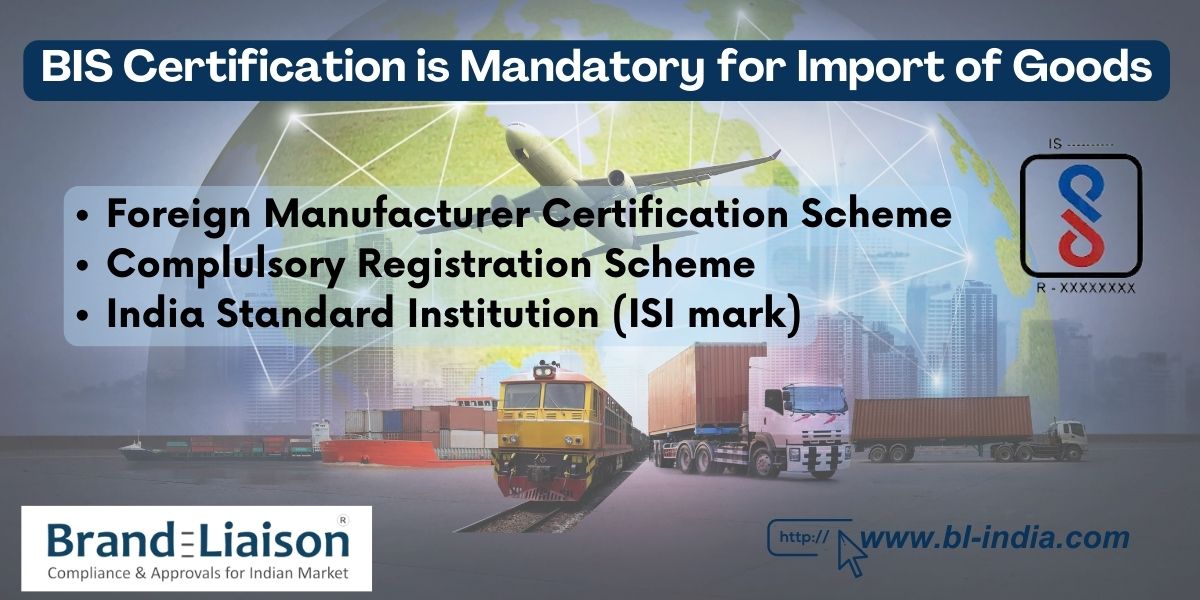Yes, in India the Bureau of Indian Standards (BIS) certification is mandatory for certain imported goods for the following reasons:
- BIS certification ensures that the products imported into India meet the prescribed quality and safety standards.
- BIS certification helps in maintaining quality control for products sold in the Indian market.
- By ensuring that all products, whether domestically produced or imported, adhere to the same quality standards,
- BIS certification often aligns with international standards, making it easier for Indian products, once certified, to be accepted in international markets.
- For products related to health and safety, such as electronic goods and machinery, ensuring that they meet specific standards is crucial. BIS certification helps in verifying that these products are safe for consumers to use.
BIS Certificate is mandate for Foreign Manufacturer Certification Scheme
The Bureau of Indian Standards (BIS) certification is mandated for the Foreign Manufacturer Certification Scheme (FMCS) for several important reasons:
- Quality Assurance: BIS certification ensures that products meet the specific quality standards set by the Indian government.
- Consumer Safety: By requiring foreign manufacturers to obtain a BIS Certificate, the Indian government is helping to protect consumers from unsafe and substandard products.
- Compliance with Indian regulations. The BIS Certificate is a way for foreign manufacturers to comply with Indian regulations for the import and sale of certain products.
- Promoting Fair Trade: BIS certification promotes fair competition in the Indian market. It ensures that both domestic and foreign products adhere to the same quality standards, preventing unfair advantages for any particular set of manufacturers.
- Consumer Confidence: Products with BIS certification instill confidence in consumers. When they see the BIS mark on a product, they know that it has met stringent quality criteria, assuring them of the product’s reliability and safety.
How to get BIS Certificate for import of any Product
Know the process of BIS Certification
- Determine Applicability: Check if your product requires a BIS Certificate. The list of products that require a BIS Certificate is on the BIS website.
- Appoint an Authorized Indian Representative (AIR): An AIR is a legal entity in India that is authorized to act on behalf of the foreign manufacturer. The AIR will be responsible for submitting the BIS application, coordinating with the BIS on all aspects of the certification process, and ensuring that the foreign manufacturer complies with all Indian regulations.
- Product Testing: Send samples of your product to a BIS recognized laboratory in India for testing. The product must meet the relevant Indian standard specifications.
- Document Submission: Submit the necessary documents, including test reports, quality manual, and application form, to BIS through your authorized representative in India.
- Issuance of BIS Certificate: Upon successful evaluation, BIS will issue the BIS certificate. This certificate indicates that your product complies with Indian standards and is eligible for import.
- Marking the Product: Affix the BIS Standard Marking (ISI mark) on your products before exporting them to India. The products must bear the standard mark in a visible and legible manner.
Conclusion
In conclusion, BIS certification is mandatory for the import of certain goods in India to ensure the safety and quality of imported products, promote fair competition, and support the Indian economy. By ensuring adherence to stringent standards, BIS certification safeguards consumers from substandard products and promotes fair competition between domestic and foreign manufacturers. Brand Liaison is a leading BIS Consultant that assists manufacturers and importers in obtaining BIS certification for their products. We provide compliance services to Indian and foreign manufacturers.



